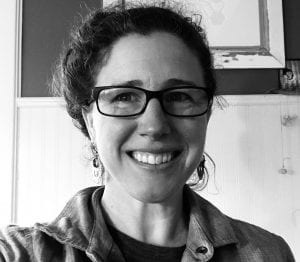Erin Goodling
I am
…a community-based researcher, working at the intersection of urban studies, environmental justice (EJ) studies, and urban political ecology to investigate the politics of homelessness, environmental change, and social and EJ movements. I completed a PhD in Urban Studies at PSU in 2017, and from 2018-2020 was a National Science Foundation (NSF) Postdoctoral Researcher, in the Department of Geography at the University of Oregon (UO). I am currently the Research and Development Director at the Western Regional Advocacy Project (wraphome.org), a coalition of seven homeless-led groups across the western US, and maintain a research affiliation with UO. I am committed to turning knowledge into action: my research questions emerge directly from community organizing with grassroots groups, and I work with organizers, artists, and “inside activists” to ensure that the research process and findings alike contribute to on-the-ground change. In turn, I connect this action research and organizing to teaching, academic debates, and policymaking processes, in an attempt to bring agents of change from diverse spheres into conversation toward more just cities.
I am currently leading a project called RESTING SAFE, which addresses homelessness and EJ. Drawing on seven years of participant observation and a national phone survey of more than fifty homeless community representatives, RESTING SAFE charts a foundational baseline Critical EJ analysis of US homelessness. This research reveals that homeless people indeed suffer from impacts of extreme weather and other climate disasters; noise, air, and soil pollution; mold, rodents, and more. Yet, I argue that to understand the EJ experiences of homeless people, it is necessary to examine much more than direct hazard exposure. Sweeps – evictions – in downtown and residential areas push people into dangerous spaces. In turn, cities overwhelmingly respond to environmental hazard concerns with more exclusion and displacement—creating a cycle of criminalization, hazardous living conditions, and serial forced removal. I articulate this incarceration-exposure-eviction cycle and analyze how it multiplies and magnifies other forms of violence that disproportionately impact homeless people along lines of race, gender, age, (dis)ability, and so on in a recent paper in Environment & Planning E: Nature and Space. RESTING SAFE also involves action research to create an “EJ Toolkit”, with tools for mitigating environmental hazards by and for homeless people. I am currently drafting a book proposal based on this work about the urban political ecology of homelessness, for invited submission to Duke University Press. www.restingsafe.org
My other main research focuses on the role of Business Improvement Districts (BIDs) in criminalizing homeless people. With the Western Regional Advocacy Project, I am co-coordinating six teams of local researchers investigating BIDs in their cities. BIDs use public money to privately police public space and those who inhabit it, often with little public oversight. We aim to uncover the inner workings of BIDs in order to stop them from making the lives of poor and homeless people ever more precarious.
Finally, I am finalizing a book manuscript based on dissertation research, tentatively entitled Green City Rising: Contamination, Cleanup, and Collective Action in an Urban Harbor, under contract with University of Georgia Press. You can find out more about my work at www.restingsafe.org and www.riseup-greencity.org.
Curriculum vitae
Publications

